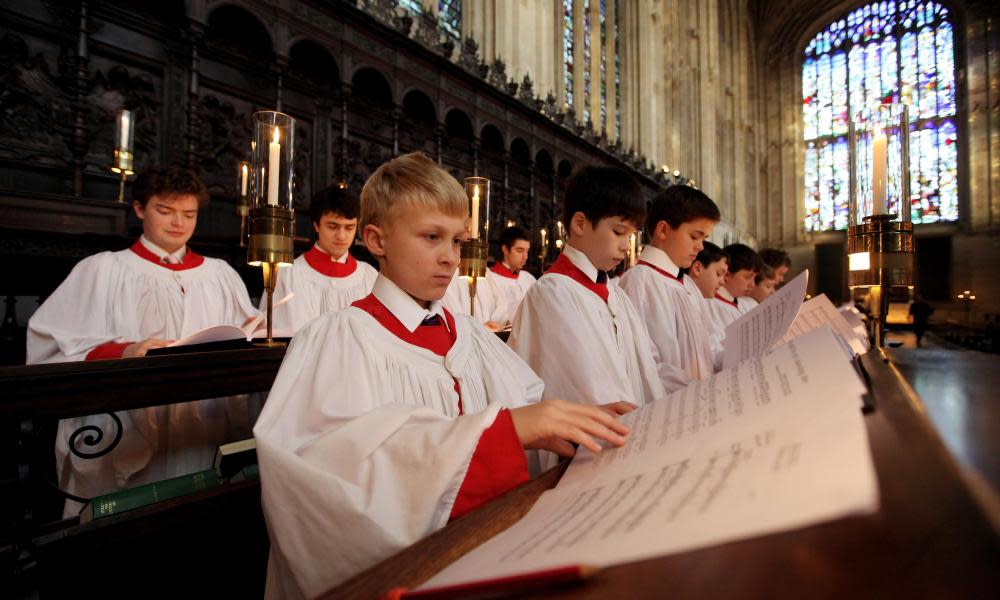Top boys’ choir embraces a new carol amid the changing times

Photograph: Oli Scarff/Getty Images
King’s College Choir, renowned for its live broadcast to the nation on Christmas Eve, is facing up to change. Not only was it accused last week of holding back progress by failing to admit girls, but also this year its celebratory 100th radio performance of A Festival of Nine Lessons and Carols will be the last for Stephen Cleobury, the choirmaster of 37 years.
Four days ago, the opera singer Lesley Garrett singled out King’s College Choir for criticism, insisting it should “wake up and listen to the music, with regard to its exclusion of girls”. The soprano argued that: “Pre-pubescent children’s voices are indistinguishable from one another. It’s a throwback to a bygone time to imagine boys’ voices are the only ones who can sing this music.”
But Cleobury’s admirers point out that there is already a mixed choir at King’s, and that when the 69-year-old director of music steps down, his legacy will, in fact, be one of musical innovation.
He has seen his job at King’s as “to season and nourish” the conventions of the choir. He was the first director to commission a new, and often avant-garde, carol each year, as well as to jettison a few of the older tunes. What is more, one of Cleobury’s daughters is a current scholar at York Minster, singing there, while his other daughter sang in Cambridge’s first all-girls college choir at St Catharine’s. To mark Cleobury’s departure, the composer Judith Weir, the first woman to hold the prestigious title of master of the Queen’s music, has created a new carol. Based on a standard carol lyric written by Charles Wesley, the cello part has been created by the acclaimed cellist Guy Johnston, a former King’s College chorister who went on to win Young Musician of the Year in 2000.
“I feel very honoured to be asked back for this,” Johnston said this weekend. “I’ve worked on my part, but I am really curious to hear the whole thing.” Weir’s new carol, he promises, will begin as a gentle meditation on the nativity scene that slowly builds in volume and energy.
Following a first rehearsal on Saturday, the televised performance for BBC2 is to be recorded on Sunday. But the real drama takes place just before the annual live broadcast that starts three hours earlier on Christmas Eve on Radio 4 when, at the last moment and for the final time, Cleobury will pick the chorister who will sing the solo at the opening of Once in Royal David’s City to an audience of 30 million listeners around the world.
“We all enjoyed walking down in a line, ‘the croc’ as we call it,” said Johnston, 37, remembering the choir’s path to the vast 15th-century chapel on Christmas Eve. “It is all very magical, but I know my throat went very dry, wondering if I would be picked.” Johnston did, indeed, have the chance to sing the solo for one of the choir’s CD recordings.
“Stephen has been at King’s as long as I’ve been alive,” said Johnston, “I followed my brothers Rupert, who had a wonderful voice, and Magnus, into the choir and we all had an amazing few years. Stephen was just so disciplined.” Although the choir performs other concerts throughout the year, ever since 1918, when chaplain Eric Milner-White set up the Festival of Nine Lessons and Carols, much of the routine focuses on preparation for Christmas Eve and the continuation of the chaplain’s war-time urge to find some comfort in the innocent voices of children.
Whether the sound of girls singing can have the same impact is now in question. Among those musicians to strongly disagree with Garrett’s attack last week is The Bach Choir’s music director, David Hill, who said: “Removing the boys and men tradition would be removing something which is unique in the choral sound world and for which this country is revered.” Hill went on to claim that lessening the opportunities for boys to sing would limit the number of tenors, basses and counter-tenors who went into the professional singing world.
For Ash Khandekar, the editor of Opera Now magazine, the row is part of a growing shift in attitudes to gender in singing. He agrees with Garrett that the voices of younger girls and boys are hard to tell apart, but he suggests there is a moment of vocal difference.
“Obviously, boys’ voices break quite significantly, but before that they grow and, while they are stronger, their treble voices are at their unbroken best,” he said. “Girls’ voices develop much more gradually. It is in those years between 11 and 13 when there can be a difference.”
And Johnston said he is grateful for his time in the boys-only choir. It allowed him to use his voice “without self-consciousness about singing high”, he thinks. “King’s is a unique tradition and a unique sound, although listening to recordings you can hear that the sound has changed under different choral directors.”
This weekend, Cleobury has talked about his “personal delight” that Weir has accepted the invitation to compose a carol for the 100th broadcast and for his last Christmas at King’s.
“A previous commission from Judith in the series, Illuminare, Jerusalem, was written for the same service in 1985 and has come to be regarded as one of the finest contemporary carols of recent times,” he said.

 Yahoo News
Yahoo News 
